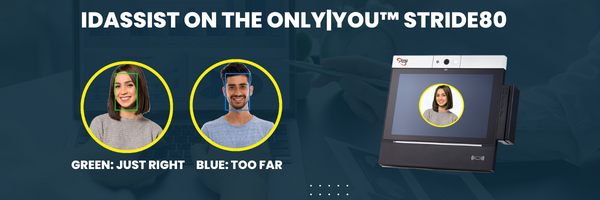13 min read
8 Ways Biometric Time Clocks are More Secure Than Mobile Devices
By: Zachary LaPlant on Jun 24, 2024 11:27:36 AM

- “I can’t find my phone!”
- “I have no wireless signal”
- “Darn, my battery died.”
- “Why won’t this app work?”
We’ve all said this at least a few dozen times about our mobile phones. But what happens when an employee, using a mobile phone to clock in and out of work, says them?
Here’s what happens: the employer loses significant amounts of money due to time theft, with a mobile only approach within your solution employees can not only buddy punch for one another they can easily falsify their own time entry from anywhere.
 But it’s easy to understand why companies opt for mobile devices to track time. People assume mobile phones would be an efficient time-tracking tool due to their personal convenience.
But it’s easy to understand why companies opt for mobile devices to track time. People assume mobile phones would be an efficient time-tracking tool due to their personal convenience.
However, millions of employees work in industries like manufacturing, hospitality, and healthcare, where individual computers are scarce. These environments are often crowded and busy.
Companies in these industries have found that relying on employee mobile devices to track hours comes with many challenges. Challenges like increased security risk and unreliable attendance data collection, among others.
In truth, mobile attendance tracking is only well-suited for employees who work in the field.
For off-site workers, a mobile app for time collection is a significant improvement over manual reporting and remains the only automated option. However, for all other employees, the drawbacks of using mobile apps for attendance tracking outweigh the convenience.
Rather than relying solely on a mobile app, implement a workforce time clock that’s always accessible for employees. Biometric time clocks, in particular, offer even greater security and reliability.
#1) Payroll Gets More Accurate Data from Biometric Time Clocks
Improving payroll accuracy is a prime motivator for automating attendance data collection. The poor reliability of mobile devices undermines this goal.
 Every time an employee can’t clock in or out on their mobile phone, someone must track and manage that work time manually. That keeps your customers bearing the costs and risks associated with manual attendance data entry and reconciliation. Your customers don’t want that. The reliability of biometric time clocks ensures your customers have maximum uptime for employees. Now your customers are collecting accurate work hours from their employees.
Every time an employee can’t clock in or out on their mobile phone, someone must track and manage that work time manually. That keeps your customers bearing the costs and risks associated with manual attendance data entry and reconciliation. Your customers don’t want that. The reliability of biometric time clocks ensures your customers have maximum uptime for employees. Now your customers are collecting accurate work hours from their employees.
Biometric time clocks also improve payroll accuracy by eliminating buddy punching and other methods employees use to inflate their hours. Mobile time tracking makes it too easy for employees to engage in time theft since the data collection is done on a private device. In this way, mobile time tracking encourages bloated payroll and labor costs. It’s harder for an employee to buddy punch at a workforce time clock with other people around. It’s virtually impossible to buddy punch using a fingerprint reader or facial recognition scan.
#2) Biometric Time Clocks are Durable
Employee time clocks are more durable than mobile devices. The lifespan of ATS time clocks is well over ten years. How long does a person keep the same phone?
Every time an employee loses, breaks, or replaces their mobile phone, the company must make sure employees install required apps and security protocols on their new devices. This requires time and resources. If the company provides employees with mobile phones, it must pay for the employee’s replacement too.
Managing mobile devices, whether company-provided or bring-your-own-device (BYOD), takes up a lot of IT resources. Your customers will feel relieved when you help them free up IT to support employees in more meaningful ways, instead of setting up new mobile devices.
The software on the biometric time clock is also more “durable.” You and your customers have complete control over the software installed and updated on the time clock. There’s no control over what employees download or click on their mobile device, elevating the risk of corruption or incompatibility. This presents a significant challenge to provide employees with IT support if the time keeping app stops working properly.
Biometric time clocks and their software are durable and cost-effective, making them a convenient choice for timekeeping.
#3) Time Clocks are More Reliable
Employees won’t always have a working phone with them. They encounter many challenges with mobile phones, that leave them without a way to track time:
 Lost temporarily: Whether their kids took it or they left it on the kitchen table, the ways we forget our mobile phones are endless.
Lost temporarily: Whether their kids took it or they left it on the kitchen table, the ways we forget our mobile phones are endless. - Battery dies: This is a situation that happens to everyone at some point. A dead battery means no way to clock in or out.
- Easy to steal: Mobile phones are prime targets for theft because they’re small and easy to hide.
Time clocks, especially biometric ones, eliminate these issues by providing a reliable and secure way for employees to track their hours.
#4) Avoid Easy Distraction
Many employers won’t let employees have access to their mobile phones at work. Increasingly, companies recognize that mobile phones at the workplace are too distracting for employees. In some cases, such as manufacturing, workers can’t have their phones on the floor.
Having access to their mobile phones negatively affects productivity and workplace safety. To work with companies that ban mobile devices, you need to provide them with a different option.
#5) Biometric Time Clocks Sync with Your Workforce Management System
Biometric time clocks will have fewer connectivity issues in your system than hundreds (or more) of mobile devices. Work hour data must consistently and dependably transfer back into your software and other systems it supports. The biometric time clock software is designed to easily and securely work with attendance software and other external solutions.
The time tracking data stored on the clock has greater protection than work hour data stored on a mobile device. If you sign up for AccuCloud, our cloud-based time collection solution, your customers data will be encrypted while stored and transferred. The AccuCloud portal allows you to monitor the data integration between each ATS time clock in your customer's network. If you choose not to go with a cloud-based solution, you can integrate ATS biometric data via flat file or web services.
Removing mobile phones connected to your and your customer’s network also strengthens your cyber security. Every phone or tablet connected to your or your customer’s network is a new device IT teams must protect from cyber threats.
#6) Improves Compliance with Strict Data Privacy Laws
Many organizations collect data subject to specific data privacy laws, such as healthcare or student information. Allowing mobile devices to connect to their network increases their risk of unauthorized disclosure. Using a BYOD program makes the risk of sharing confidential information higher.
These organizations can avoid the risk by not allowing employees to use mobile devices while at work.
#7) Easy for Employees to Enroll
The biometric enrollment process is simple. Employees can guide themselves through it with simple instructions provided by ATS, or HR managers can walk them through it.
Employees don’t have to climb a steep learning curve to know where to stand or place their finger on the biometric time clock. Customers can quickly see the value of biometric time clocks without needing to train employees to use them.
Your customers should also know that ATS biometric time clocks are easy to implement without disrupting business operations. A customer that already has ATS time clocks can likely have the biometric reader installed as an add-on. When installing new time clocks, there is no extra work needed for a biometric time clock compared to a traditional workforce time clock.
#8) No Need to Complicate Policies for Employee BYOD
Both employers and employees worry about data security and privacy, especially when employees are using personal mobile devices. Consequently, companies willing to run a BYOD program need to draft complicated policies regarding the use of employee-owned devices that connect to the company network.
We noted earlier the general security concern about the vulnerability of mobile devices as gateways to your customers’ entire tech ecosystem. However, there are also concerns about data that might get shared between a mobile device and your system. Will the mobile application also get HR-related data?
Employees have reason to be concerned whether employers may be able to access personal data on their devices. Some companies may ask employees to install a remote data deletion app to protect company data. But what will it do to the personal data?
The Privacy Rights Clearinghouse provides an overview of the security, privacy, and legal issues that a BYOD policy must address.
Biometric Time Clocks are the Stronger Option
Help customers avoid the stress of managing employee BYOD programs and other issues with using mobile devices for time tracking. When you can offer a biometric time clock system to your customers and prospects, you’re assisting them move onsite employees away from mobile devices and improving attendance tracking for the entire company.
Contact ATS today to learn more about the different biometric time clock options that could benefit your customers.
Related Posts
This is why customers love employee time clocks
As a SaaS provider, your software, whether it's a time and attendance system, payroll package, or...
Introducing Facial Recognition Time Clocks to Your Organization
AccuCloud, our cloud-based time and attendance solution, has been gaining traction with sales teams...
5 Reasons to Sell Time and Attendance Clocks
No time attendance software solution is truly automated without time and attendance clocks...
Biometric Usage: Growing concerns over the privacy and security of biometrics are driving government regulations surrounding the definition of personal data and how to protect it. These regulations vary from country to country, state-to-state, and in some cases city by city. Most often the governing regulations are dictated based on the location where the information is being collected. It is important to understand the local regulations in the geographic areas in which you operate. If you are uncertain regarding your regulatory obligations, we encourage you to consult with your legal counsel.



